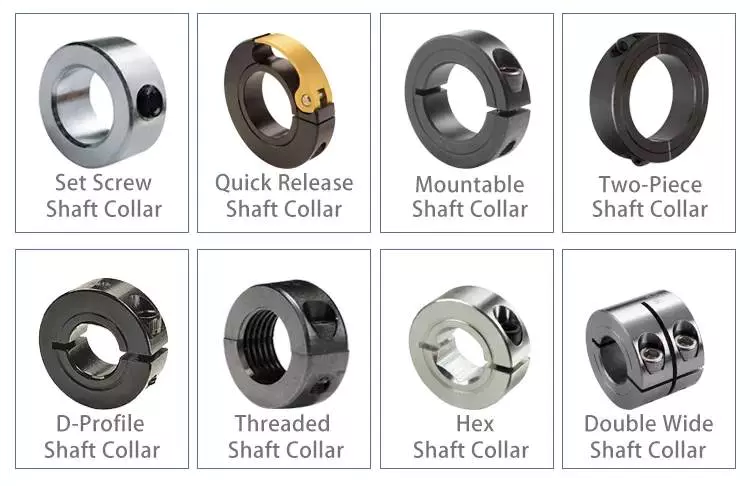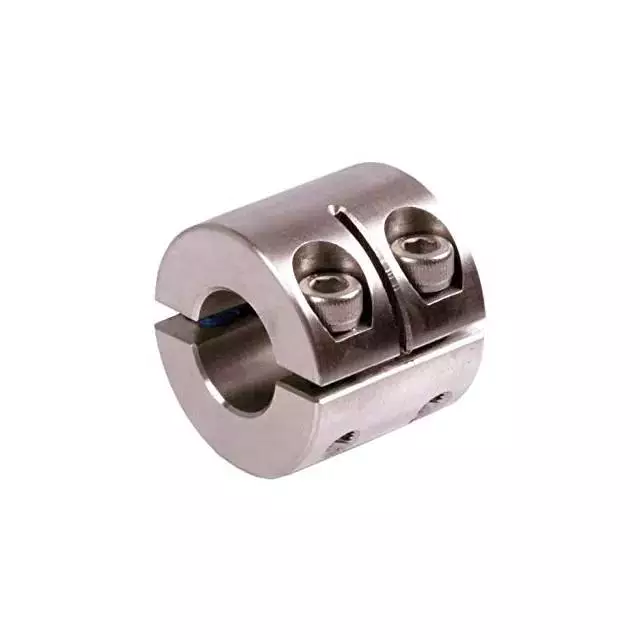
Can I find information on alternatives to traditional shaft collars for specific applications?
Yes, information on alternatives to traditional shaft collars for specific applications is available. In addition to traditional shaft collars, there are various innovative solutions and alternative devices that can be used depending on the specific application requirements. Here are some sources where you can find information on alternatives to traditional shaft collars:
- Manufacturer Websites and Catalogs: Many manufacturers of mechanical components provide detailed information on their websites or in product catalogs about alternative devices or solutions to traditional shaft collars. These resources often highlight specific applications, industries, or challenges where alternative devices may be more suitable. Exploring manufacturer websites and requesting catalogs can help you discover innovative options.
- Technical Publications and Journals: Technical publications and journals focused on mechanical engineering, automation, or industrial applications often feature articles or case studies discussing alternative devices for various applications. These resources provide insights into the latest advancements and emerging technologies in the field. Accessing academic databases, engineering libraries, or subscribing to relevant publications can help you access this information.
- Engineering Conferences and Seminars: Attending engineering conferences, seminars, or workshops related to mechanical components or industrial automation can provide opportunities to learn about alternative devices through presentations, panel discussions, or technical sessions. These events often bring together experts, researchers, and industry professionals who share their knowledge and present innovative solutions. Checking event calendars, industry association websites, or engineering organizations can help you find relevant conferences or seminars.
- Online Engineering Forums and Communities: Online engineering forums, communities, and social media groups dedicated to mechanical engineering or industrial automation can be valuable sources of information on alternative devices. These platforms allow engineers and professionals to exchange ideas, discuss challenges, and share their experiences with different solutions. Participating in these forums, asking questions, or searching for relevant discussions can provide insights into alternative devices for specific applications.
- Consulting with Industry Experts: Seeking advice from industry experts, such as mechanical engineers, industrial automation specialists, or application consultants, can help you explore alternative devices tailored to your specific application requirements. These professionals have in-depth knowledge of the field and can provide personalized recommendations based on your needs. They can be contacted through engineering consulting firms, professional networks, or by reaching out to manufacturers directly.
When considering alternatives to traditional shaft collars, it is important to thoroughly evaluate the specific application requirements, including factors such as load capacity, precision, environmental conditions, space limitations, and maintenance considerations. Each alternative device may have its own advantages and limitations, and it is crucial to select the most suitable option based on the unique needs of your application.

Where can I find information on the materials used in manufacturing shaft collars?
If you are looking for information on the materials used in manufacturing shaft collars, there are several sources where you can find relevant information. Here are some common resources to consider:
- Manufacturer Websites: Many manufacturers of shaft collars provide detailed information about the materials they use in their product specifications or technical datasheets. Visiting the websites of specific collar manufacturers and exploring their product documentation or resources section can help you find information about the materials used in their collars. This information may include the type of material (such as steel, stainless steel, aluminum, or plastic) and any specific properties or characteristics associated with the material.
- Product Catalogs and Brochures: Manufacturers often publish product catalogs or brochures that provide an overview of their collar offerings. These catalogs may include information about the materials used in manufacturing the collars. You can request catalogs from manufacturers directly or check their websites for downloadable versions. The catalogs may highlight the material properties and advantages of using specific materials for different applications.
- Material Databases: Online material databases or directories can be valuable resources for finding information about specific materials used in manufacturing shaft collars. These databases typically provide comprehensive information about various materials, including their composition, mechanical properties, corrosion resistance, temperature tolerance, and other relevant characteristics. Examples of such databases include MatWeb, Engineering Toolbox, or specialized materials databases maintained by industry organizations or universities.
- Technical Standards and Specifications: Technical standards and specifications related to mechanical components can often include information about the materials used in their construction. Standards organizations or industry associations may release documents that outline the material requirements for shaft collars or provide guidelines for material selection. Accessing these standards or specifications can provide insights into the recommended materials for shaft collar manufacturing.
- Consulting with Manufacturers or Suppliers: If you have specific questions about the materials used in manufacturing shaft collars, reaching out directly to manufacturers or suppliers can be beneficial. They can provide detailed information about the materials they use, including their composition, properties, and any specific treatments or coatings applied to enhance performance. Contacting manufacturers or suppliers allows for direct communication and the opportunity to address any specific concerns or requirements you may have.
When seeking information on materials used in shaft collar manufacturing, it is important to consider factors such as desired properties (e.g., strength, corrosion resistance), environmental compatibility, and application-specific requirements. This will help you make informed decisions about selecting shaft collars that are suitable for your specific needs and operating conditions.

Where can I buy high-quality shaft collars for industrial applications?
When looking to purchase high-quality shaft collars for industrial applications, there are several options available. Here are some common sources where you can find reputable suppliers:
- Industrial Suppliers and Distributors: Industrial suppliers and distributors specialize in providing a wide range of components and equipment for industrial applications. They often carry a variety of shaft collars from different manufacturers. You can search for local industrial suppliers in your area or explore online industrial supply websites. Some well-known industrial suppliers include McMaster-Carr, Grainger, MSC Industrial Supply, and RS Components. These suppliers typically offer a range of options and provide detailed product specifications to help you choose the right shaft collar for your specific requirements.
- Specialty Manufacturers: Some manufacturers specialize in producing shaft collars and related components. These companies often have a strong focus on quality and may offer specialized solutions for specific applications. Research and identify reputable manufacturers that produce high-quality shaft collars. You can visit their websites to explore their product offerings, specifications, and contact information. Some notable manufacturers in the industry include Ruland Manufacturing, Stafford Manufacturing, Climax Metal Products, and Collars and Couplings.
- Online Marketplaces: Online marketplaces provide a platform for various sellers to offer their products, including shaft collars. Platforms like Amazon, eBay, and Alibaba have a wide range of options available from different sellers. When using online marketplaces, it’s important to carefully review seller ratings, product descriptions, and customer reviews to ensure the quality and reliability of the shaft collars being offered. Look for sellers with positive ratings and reputable customer feedback to increase the likelihood of purchasing high-quality products.
- Local Machine Shops and Fabricators: Local machine shops or fabricators that specialize in machining or fabricating custom parts may also offer shaft collars for sale. These shops often have expertise in working with various materials and can provide customized solutions if needed. Contact local machine shops in your area and inquire about their availability of shaft collars or their ability to fabricate them to your specific requirements.
- Trade Shows and Exhibitions: Trade shows and exhibitions related to industrial components and equipment can be excellent opportunities to explore a wide range of suppliers and manufacturers in one place. Attend industry-specific trade shows or exhibitions and visit booths or displays of companies specializing in power transmission, bearings, or mechanical components. This allows you to interact directly with manufacturers or suppliers, discuss your requirements, and assess the quality of their products firsthand.
When purchasing shaft collars for industrial applications, it’s important to consider factors such as material quality, dimensional accuracy, load-bearing capacity, and any specific requirements of your application. Thoroughly evaluate suppliers, review product specifications, and compare prices to ensure you are getting high-quality shaft collars that meet your needs. Additionally, consider factors such as lead time, customer support, and return policies when making your purchasing decision.


editor by CX 2024-04-10